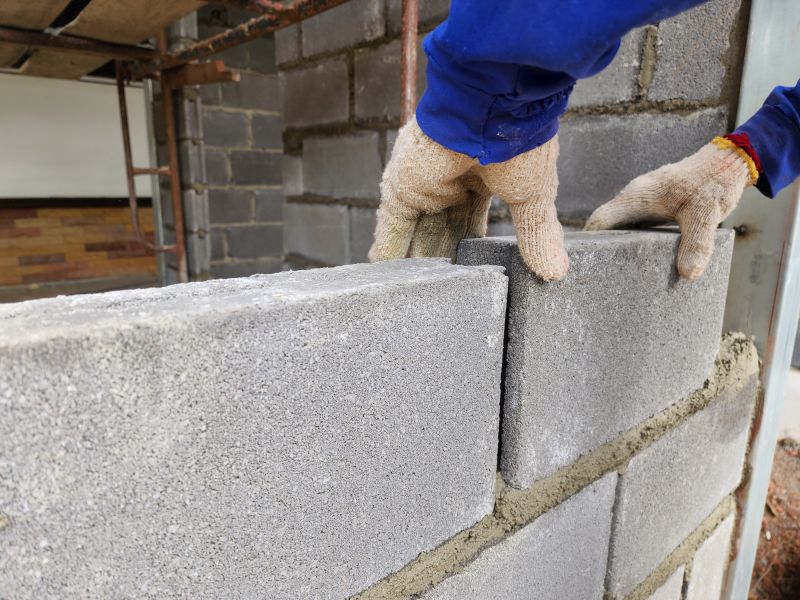Expert Picks For Block Wall Repair Products To Simplify Your Project
Find the most reliable and user-friendly products recommended by professionals for efficient block wall restoration.
 Block wall repairs are essential for maintaining the structural integrity and aesthetic appeal of various properties. Over time, concrete blocks can develop cracks, chips, or other forms of damage due to weathering, settling, or impact. Addressing these issues promptly with the right repair products can help extend the lifespan of the wall and prevent further deterioration. Repairing a block wall involves selecting appropriate materials that match the existing structure, ensuring durability, and applying the repair correctly for a seamless finish.
Block wall repairs are essential for maintaining the structural integrity and aesthetic appeal of various properties. Over time, concrete blocks can develop cracks, chips, or other forms of damage due to weathering, settling, or impact. Addressing these issues promptly with the right repair products can help extend the lifespan of the wall and prevent further deterioration. Repairing a block wall involves selecting appropriate materials that match the existing structure, ensuring durability, and applying the repair correctly for a seamless finish.
Top Overall Option
Versatile Block Wall Repair Compound
This multi-purpose repair compound is designed to work with various types of concrete blocks and masonry surfaces. It offers ease of application, good adhesion, and a smooth finish, making it suitable for both minor cracks and larger repairs. The product is formulated to withstand weathering and provides a durable, long-lasting solution for maintaining the integrity of block walls.
Types of Products For Block Wall Repairs
Pre-mixed Masonry Patching Compound
Ready-to-use patching compounds designed for quick repairs of cracks and holes in block walls.
Polymer-Modified Repair Mortar
High-strength mortars enhanced with polymers for better adhesion and flexibility in structural repairs.
Hydraulic Cement Patch
Fast-setting cement ideal for sealing leaks and repairing damaged masonry surfaces.
Epoxy Injection Kit
Specialized kits for filling deep cracks and reinforcing the wall's stability.
Waterproof Sealant
Sealants that provide a protective barrier against moisture infiltration in block walls.
Surface Bonding Agent
Primers that improve adhesion of repair materials to existing masonry surfaces.
Flexible Crack Filler
Products designed to fill and seal cracks that may experience movement or expansion.
Concrete Resurfacer
Thin layers of repair material used to restore the surface of worn or damaged block walls.
Grout for Masonry
Specialized grout for filling joints and stabilizing masonry units.
Expansion Joint Sealant
Flexible sealants that accommodate movement between wall sections.
Bonding Mortar
Adhesive mortars used to attach new blocks or repair broken sections.
Chipping and Surface Repair Putty
Putty for minor surface repairs and surface smoothing.
Concrete Dyes and Stains
Products for color matching or enhancing the appearance of repaired areas.
Heavy-Duty Repair Mix
Robust mixes designed for restoring structural integrity in damaged walls.
Quick-Set Patch
Fast-curing patch materials suitable for urgent repairs.
Foam Backer Rods
Backer materials used to fill large gaps before applying sealant or mortar.
Masonry Cleaner and Prep Solution
Cleaning products that prepare surfaces for optimal repair adhesion.
Popular Choices
Widely used for quick and easy repairs of cracks and small holes in block walls.
Commonly selected for sealing leaks and repairing damaged masonry surfaces quickly.
Popular for filling deep cracks and providing structural reinforcement.
Frequently chosen to protect walls from moisture infiltration.
Favored for sealing cracks that may expand or contract over time.
Often used to restore worn or uneven surfaces with a smooth finish.
Commonly used for filling joints and stabilizing masonry units.
Popular for attaching new blocks or repairing broken sections.
Chosen for restoring structural integrity in heavily damaged walls.
Ideal for urgent repairs requiring rapid curing.
Used for minor surface smoothing and patching.
Commonly used to prepare surfaces for optimal adhesion of repair materials.
There are numerous products available designed specifically for block wall repairs, ranging from patching compounds and mortars to sealants and waterproofing solutions. The choice of product often depends on the extent of damage, whether the repair is superficial or structural, and the desired appearance after the repair process. Proper surface preparation, including cleaning and removing loose debris, is crucial for optimal adhesion and long-lasting results.
In addition to repair compounds, tools such as trowels, spatulas, and brushes are often necessary to apply these products effectively. For larger or more complex repairs, it may be advisable to consider professional consultation or assistance. Whether fixing minor cracks or undertaking more extensive restoration, selecting the right products can make the process more manageable and the results more durable.
Understanding the different types of repair products and their specific uses can help in making informed decisions. From quick-setting patching compounds for small cracks to high-strength mortars for rebuilding sections of the wall, the right product can facilitate a more efficient repair process. Proper application and curing are essential to ensure the longevity and stability of the repaired wall, contributing to the overall safety and appearance of the structure.
Key Buying Considerations
- Extent of damage and size of repair area to select appropriate product type.
- Compatibility of repair materials with existing masonry surfaces.
- Curing time and whether fast-setting options are necessary for your project.
- Weather conditions and environmental exposure to determine durability requirements.
- Ease of application, especially for DIY repairs versus professional jobs.
- Adhesion properties to ensure the repair bonds well with existing blocks.
- Flexibility of the product to accommodate wall movement or expansion.
- Waterproofing capabilities for areas exposed to moisture or leaks.
- Color matching options if aesthetic blending is desired.
- Curing and drying times to plan the repair schedule effectively.
- Compatibility with tools and accessories needed for application.
- Long-term durability and resistance to cracking or crumbling.
- Cost considerations relative to the scope of the repair project.
- Environmental safety and handling instructions of the repair products.
- Availability of supplemental products like primers, sealants, or fillers.
